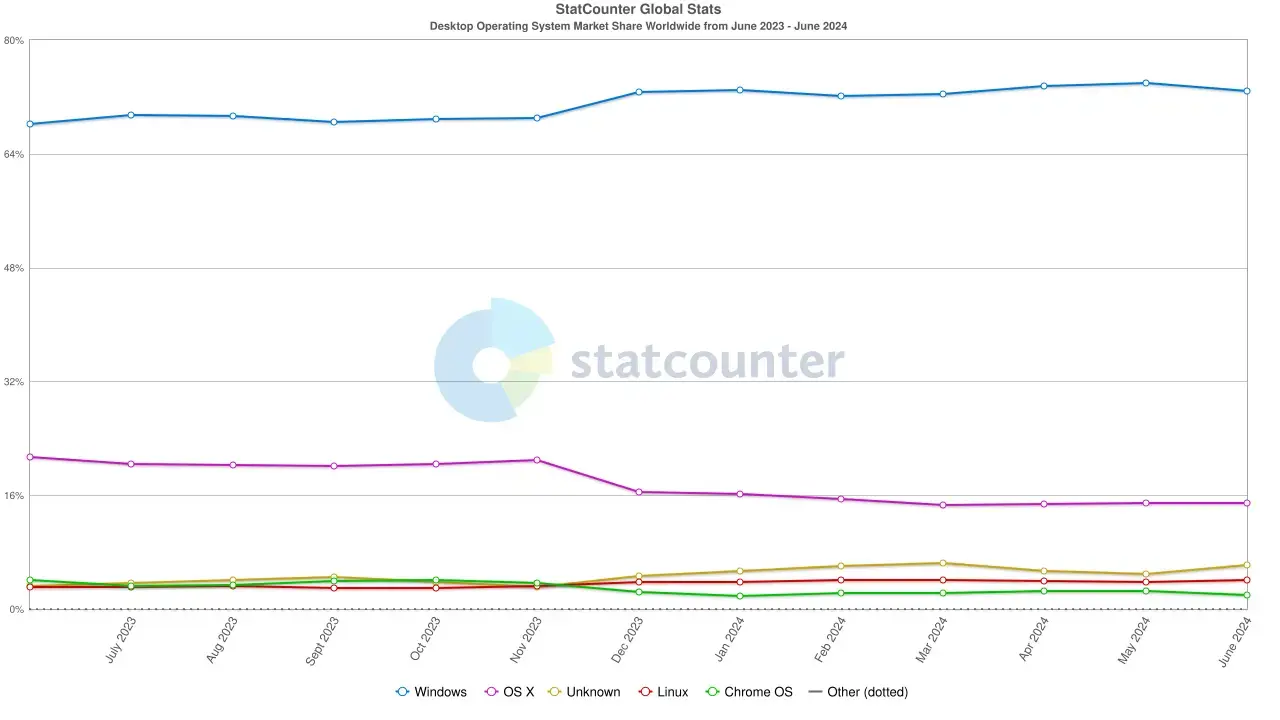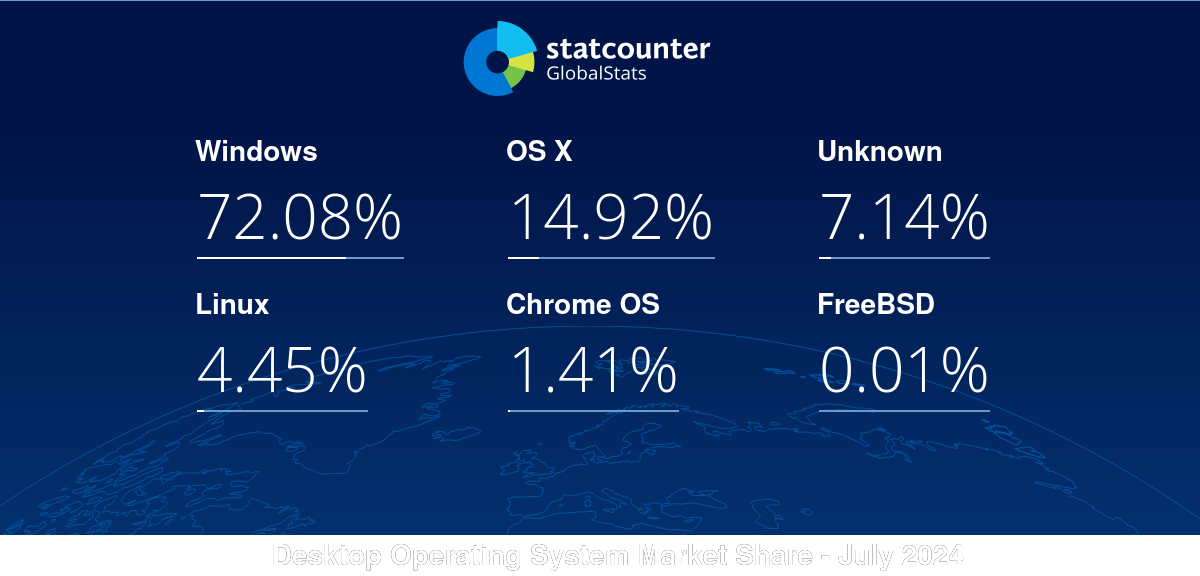Nobody using TempleOS? =(
THE LORD NEEDS NO NETWORKING!!! THE LORD IS THE NETWORK!
U glowing
If you pray hard enough, the Lord will make the websites appear on your screen!
Thank you Windows 11!
Time for me to go FreeBSD i guess
Is someone kind enough to post a screenshot of the stats? I can’t access it, because its a known tracking site and get blocked by the plugins.
Okay, I have bit the bullet and made an exception to provide screenshots myself:


Next time try out visiting the page through archive.org
I didn’t think of it, because I always think or archive.org as older pages/versions. The problem is, is it updated to current? It’s a big site, so probably it will be. Good idea, I’ll check that next time through archive.org.
You can always* request a new archive of a website. If you log in (warning: it has to load google code at least when registering) you can also request a screenshot (which I don’t know how you find later on, but right after you get a link) and recursive archiving with a depth of 1.
Interactive elements remain interactive nowadays, but it has limitations.In some cases archive.today is worth a try too. It has workarounds for e.g. facebook, or at least in the past it had a fake account to be able to save facebook content.
But this one loads whatever code from yandex, so if that’s problematic for you be sure to block it. uMatrix is best for that task, probably uBO can do it too, the Firefox version I mean.These sites are basically my “remote browser”, and often it’ll be even useful for others that I requested an archive. Quite often I’m requesting the first one.
* mostly, but you can’t if the site was very recently archived, like in 30 minutes. Then there are some sites that are blacklisted for some reason but not much.
I wonder what happened to OS X
It does not mean that something happened with MacOS / OS X. If it stays the same and everyone else gets bigger, then the same gets smaller relatively speaking. Look at the dip for OS X in Nov 2023. Looks like almost the same amount of up for Windows. Also Chrome OS went a bit down and Unknown went up, only Linux stays the same.
So either something in their software changed or it was really a phase of people buying new computers and changing their OS. For a fact, I also build my PC in Nov 2023 (but stayed on Linux). Maybe that was a time of new hardware or lower prices, don’t remember exactly.
Thanks for your service, comrade.
How far down are PC sales in general though?
Is it that more people are buying Linux, or fewer Windows customers are buying new computers at all?
A few years ago, you’d have households with a laptop for every member of the family. Now with tablets and phones doing so much of the heavy lifting, many families are dropping to just 1 Windows or Mac laptop that mostly gathers dust.
My experience is more people having those devices on top of having laptops. I don’t know a single person in Uni that does not have a laptop at all. At last when it comes to writing reports or thesis you just need a proper keyboard device.
Meanwhile gaming and also PC gaming has become much bigger over the years, which keeps driving computer sales.
Believe it or not - but most people actually aren’t college students. Crazy, right?
Anybody in this forum isn’t a typical tech user.
I carry 3 laptops in my backpack (one for 8-5 job, one personal, and one for teaching night classes at the University) along with a foldable phone, a work phone, and e-ink notepad.
Between my 3 laptops, Rog Ally, 2 desktops, and some old laptops I keep around for media devices and network interfaces around the property, I’ve got like 10 Windows machines in my life.
But I also know I’m an outlier.
ooh! what’s the e-ink notepad, and what’s your usecase like?
it seems so appealing to just have a functionally infinite notebook on hand, but i’ve yet to find one that could ACTUALLY replace a regular physical notebook for me.
Boox Tab Ultra C.
It’s a 10" color e-ink tablet that runs Android.
Don’t get the keyboard case for it - it sucks hard. It’s so thick it turns it into another laptop, it types terribly, and when folded backwards so you can write it still tries taking over from the pen.
Other than that I love it.
argh that’s literally the ONE that was tempting me, now I guess I GOTTA buy one! this sucks!
(thank you so much i’ve wanted to buy this since it came out)
Have you told your therapist?
If you carry three laptops around you are definitely doing things wrong. There is no real world scenario where doing what you say you do needs 3 physical computers, and if you have a 9-5 AND teach night classes , you don’t have extra minutes to use your “personal” laptop that day, which leads me to call bull on the carry 3 laptops thing
The course I teach involves photo and video editing, which I do on my personal laptop for 2 reasons:
- Because I own the photos and videos I capture, the raws stay on my device.
- My personal laptop has a lot more horsepower
I can see it. My corporate work laptop is locked down with their security and monitoring software, so I’m not using it for personal things, even if it is allowed for some limited things. And there’s company resources that I can only access through the machines under their control, so I couldn’t ditch it either. And using that laptop for a second job would be a big no-no.
I can see the school laptop being similar, though my experience is that they tend to not be locked down quite as hard as the corporate machine, unless you do boneheaded things with it and piss off the school’s IT department.
So I can see the need for a personal computer, plus it’s always nice to keep that well separated to avoid things like incidents hooked up to a projector and screen sharing.
I used to think that I’d be glued to my PC forever, but ever since getting a foldable I’ve found that I’m no longer reliant on computers anymore for daily tasks. Plus there’s no point in eating up 300w of electricity during the summer (according to my watt meter), just to watch YouTube.
These days the only time I boot my PC is to play a game, search for a job, or make a large purchase. I’m a MilleniaI, so big purchases have to be done on the big computer. The phone is more than adequate for everything else. It’s not the 2010s anymore; phone screens are finally large enough now to replace a PC, and there’s an Android equivalent for almost everything a computer can do.
Programming? Nah. It’s a consumption device, not a creation device.
I’m not a programmer.
deleted by creator
Really ain’t writing code in termux. I want an IDE. Why use a substandard device?
deleted by creator
Both
Windows isn’t only losing markershare to linux, but also to android and ios. That can be seen in the chart for all OSes, also available in that site:
https://gs.statcounter.com/os-market-share#monthly-201501-202407
It’s also interesting to notice that linux is growing in that chart, which means that linux is really growing in popularity, and it’s not just an effect of the desktop market possibly shrinking or something.
or people are like me, not gamers, so perfectly contented to upgrade old used PC gear…shoehorn a CPU in with higher core count, max out RAM with a new matched pair of sticks, install a fresh NVMe drive, good to go!
I recently ordered parts from China to repair my old mechanical keyboard =_= Also ordered fancy new mice for other PC’s & wife’s laptop woo just a little tech refresh goes a long way for me =_=
soon we will reach the magic number companies need to finally consider supporting Linux for once
What is that magic number?
Always 5% higher than it currently is.
100%
Hmm is this really happening so fast? It’s a little hard to believe.
I suspect it’s a bump due to Windows Recall. I know I fully switched because of it after 25 years of off and on the Linux Desktop. And I will not be going back.
I suspect it’s a bump due to Windows Recall.
I don’t believe it that much. It may just be the Steam Deck’s financial success. But everything is possible.
I wasnt thrilled about upgrading to win11 - it adds an irritating layer of stuff that I didnt want or need. The ads and telemetry bugged me too. I was probably going to reluctantly upgrade at some point though.
But then recall was announced and I realised how much worse it could get. Been really happy with the switch to Linux.
What distro do you use?
Mint cinnamon 21, then upgraded to 22.
Great choice
Maybe not, but, anecdotally, I know of a number of people who have made the switch because of Recall. Steam Deck surely adds to it, but people who have the choice to stop using Windows seem to be doing so.
Maybe not, but, anecdotally, I know of a number of people who have made the switch because of Recall.
Tbh I don’t get it. Wasn’t this feature only on Copilot+ PCs that almost nobody had? Why did so many switch if it wasn’t even confirmed that it’s coming to regular x86 machines? I always find it extremely weird.
Why did so many switch if it wasn’t even confirmed that it’s coming to regular x86 machines?
Panic.
deleted by creator
Microsoft showed their hand and for some it was the last straw. It might not come to non-copilot pcs (for now) but they showed users they are OK with turning the OS into spyware.
Imo Windows is not even an OS anymore.
Agreed. It’s mostly an ad delivery platform these days. Can be somewhat OK if you have a DNS based blocker but hard to block built in spyware.
100% switched because of Recall. Been a Linux user on and off for 20 years, windows was my daily driver for the past 5 or so (windows 10 was OK in my mind). Once Recall was announced, I bounced back to Linux. Having Steam popularize gaming on Linux has helped a ton
Considering this is browser stats I doubt the steam deck has much to do with it, the steam deck is all about never opening anything other than steam.
Are you sure Steam is not one of the data suppliers for it though?
Steam deck alone isn’t much. It’s not even popular in a lot of places in the world. But there are a lot of things happening in the market, and each small factor adds up to a general trend. So, there’s no single factor that we can point that will explain the linux growth in marketshare.
deleted by creator
GloriousEgroll and Valve have essentially made gaming on Linux as viable as it has ever been. The only issue remaining has to do with stupid anti-cheat software. Thank goodness I don’t play any games that use any of them.
That’s what she said
Yes, things move very fast if you haven’t noticed sugar pie
Sus
There’s some kind of network effect associated to it, so the greater the numbers, the more likely to grow even more, and faster. For example, when linux was used only by a very few people in IT, most people were unlikely to even give it a try, but now that every class or working group are likely to have one or two linux users, more people will be likely to try it, and so on.
Yes, although it’s not evenly distributed. Much of this rise is due to India doing some heavy lifting - they’re on like 16%, and they’re not exactly a small population.
Most places are in the 1.5-3.5% range.
Even 3.5% is quite a lot imo.
Indeed it is. But this is also calculated based on monthly page views, so it only really covers devices that are used in that month.
There’s a non-trivial amount of Windows users that have a dusty laptop that they only pull out when they need to write a document or fill in a form that they got emailed, and will otherwise do all their computing on their phone.
My guess would be that Mac and Linux have fewer of these types of users? But who knows. I have a couple of Linux devices that I almost never use 🤷♀️
I’ve seen many people having Linux on such devices so idk either.
You should go to your local university or knowledge center. The percentage is like 10%-20%
The crowdstrike failure is probably helping Linux.
I highly doubt businesses would have been this fast in making the switch.
It helps to move quickly when your entire infrastructure crashes.
One crash will absolutely not make this big of an uptick. The amount of highly specialized software and hardware that is OS dependant means switching will only be possible when those companies, hell really entire industries, decide to move over to a more open standard soft/hardware setup. In this case, a crash is a big deal, but the IT teams get on it and fix it in a day or two.
Also, certain Linux machines were affected by the cloudstrike outage. Even less reason to switch when the alternative was effected as well.
This is what I was thinking when it happened. Businesses lose a shit ton of productivity and money due to Microsoft and Windows being a clusterfuck in multiple ways and they decide it’s time to switch to something more stable.
Actually, crowdstrike has a very bad record regarding this, their services even managed to break Debian servers one time.
Source: some article.
In fact, that failure occurred this year. Now all that’s left is for macOS to have a failure with that company and the collection is complete.
I believe BSD has more servers than macOS.
I’m so happy.
But also liked when linux felt like a secret.
Microsoft finally did something right: they made their shitty product shitty enough for people to realize it.
But also liked when linux felt like a secret.
Don’t worry. You can still tap into that sweet sweet Linux elitism by running an Arch based system or a tiling window manager.
That’s old news, NixOS is the new hotness
Only if you’ve installed Arch itself, using a GUI is noobs.
I see your Arch and raise you a Gentoo.
I’m sorry, can you clarify what you wrote? I read it but then got distracted by my cursor moving on its own while I was reading an article about xzutils. Perhaps I should read it again since it made no sense the first time.
I think Gentoo with no binaries should be the new archlinux. I’ve literally used archlinux virtually unchanged outside of updates for years now. It’s been trouble free outside of some minor bugs and I change my settings in the kde settings panel 90% of the time.
Also what the fuck is a tiling window manager? I want it!
Instead of having your windows float around, they perfectly snap and fill the space of the monitor depending on how many windows you have open. A new DE in alpha right now called Cosmic has both floating windows and tiling, you can change with just a toggle.
Cosmic is great so far, I run it on Fedora.
I want my windows anywhere I want them, and in Cinnamon I can snap windows to corners, o top, or bottom… Being forced to work tiled is backwards.
If as someone mentioned in Cosmic you can toggle it off and on ( and the toggle is esasily accesible, not buried in settings) I’m fine with that
“Being forced to work tiled” that’s the main feature of a tiling wm though…
If you tried it for a while, you’d realize just how annoying floating windows really are. All that manual positioning, focus issues, getting them stuck or hidden behind other windows, etc. For big monitors, I would say tiling is just flat superior to floating windows managers.
Oh my gosh I need this now.
Fedora? 🤢 jk
The big common ones are i3, Hyprland, or Awesome. However, there are tons out there and there is no right answers.
Is the data of specific distros available somewhere ?
Unsurprisingly, usage numbers for distros are hard to get due to lack of telemetry and what not.
However, some measurements do exist; like data from ProtonDB. These are used by Boiling Steam for their excellent reports in which some representation regarding usage across distros can be found. Their most recent report can be found here.
Note, however, that the following, as has been excellently touched upon by Boiling Steam, applies:
COMMON MISCONCEPTIONS
Since we hear some of the following comments EVERY SINGLE TIME, let’s address them here and now:
- “Duh, it’s not representative of Linux usage in general!”: And nowhere does it claim to be. As often as possible we make it clear this is Linux usage in a gaming context. The usage of Debian and Ubuntu on servers is safe for now, no need to panic.
Thank you. This does give an idea.
Follow up question : Is Arch really that good?
Thank you. This does give an idea.
It has been my pleasure.
Follow up question : Is Arch really that good?
Depends entirely on your needs. There is a use case for Arch. However, if you’re completely new to Linux, then it’s very likely that a ‘slower’-moving distro (like (anything based on) Debian (or Ubuntu)) might better suit you.
To the moon!!! ┗(°0°)┛ …○
Il feels like every month that passes Linux keeps breaking all time highs! So exciting
deleted by creator
If only MS Office worked well on Linux, due to her muscle memory, my wife would’ve switched to Fedora for her laptop. Aside from light gaming (Sims 4, mostly), she’s not a tech-person at all, so that’s saying something in my book!
deleted by creator
At this rate the Year Of Linux On The Desktop will be 2033!!!
2033!!! = At least 16
Call me naive, I know I am. But how can Linux be a moderated product to sell for desktop? I know phones run Linux, and many other products like streaming pucks run Linux (or is called unix?), but what would it take for an operating linux system to be centralized into a package to toss into a lenova laptop you’re staring at in best buy?
One way to do it is for each company to develop their own flavor to ship with their laptop, in much the same way phone manufacturers just modify Android and ship it.
As an example, check out System76 and their laptops featuring their Pop!_OS distro, which is very user friendly and stable in my experience.
Some laptop manufacturers (and at least one of the larger ones) already offer Linux (Ubuntu) as a pre-installed OS. I suspect this will become more common if/when Linux becomes more popular as a mainstream desktop OS. Most likely it will still be 1 or 2 pre-selected distros though even then.
That’s really cool I didn’t know that was an option already. How does Ubuntu and windows compare for operating system support if I have a problem with the laptop? Is the manufacturer liable for the smooth running of the operating system? Or is the owner of the operating system liable?
It’s a good question but I honestly have no idea how that works even today with windows actually because I have not owned a laptop in 15 years. In my mind, the laptop manufacturer has to guarantee compatibility with any OS it provides but even then, some support from the OS side may be needed. The best way to handle that would be if the manufacturer started contributing to the Linux kernel and provide full driver support because then everybody wins in the long run.
It’s a tough sell because there is no monetary incentive to get Linux on laptops and desktops. Dell has a few computers that ship with Ubuntu, and Lenovo with Fedora, and there’s System76. The problem is that the big manufacturers (namely Dell) get push-back from Microsoft if they start to sell other OSes with their products, so they no longer have 100% domination. Microsoft will say “Oh you’re selling a few products that come with Linux? Well, we won’t offer you the ability to sell Windows anymore…” which would obviously be a huge impact to their business. They have gotten around this, but their offerings are still really slim. The market just isn’t there compared to Windows based computers. Shelf space is expensive so they go with what sells: Windows based products.
Is it because Microsoft is the big dog with money and Linux is no dog because there is no company backing Linux? Windows sells solely because Windows can push the product?
Would it be benificial (albeit this will be extremely frowned upon by this community I believe) for a Linux distro to be backed and monetized via a corporation with a legal team to help push a Linux product on the shelves? In the short run it’s a bad idea, but in the long run it’ll familiarize the public, and push software developers for compatability. The incentive being that there’s money now involved and it won’t be a project for people.
Because right now to use Linux for the majority of user case operations you’d need at least computer science 101 to start installing a distro, partitions, manual software installation, to get running. Or am I wrong on this part?
There are a couple of OEMs like System76 and Starlabs that sell laptops with Linux on them, provide tech support for customers and so on.
And no, installing most distros aren’t hard. You just click the buttons to proceed and fill out the username and password box, select your time zone and select your wi-fi network if you’re using wifi.
You can do manual partitioning but why would you if you don’t know what you’re doing?
Installing software in the GUI is as easy as installing software from the Microsoft Store. Just search or look around and when you see something you want, just click the Install button.
how can Linux be a moderated product to sell for desktop
It kinda depends on each individuals’ use case; there’s lots of different Linux distributions that are better (or worse) for specific workloads.
Any given laptop I’m staring at in a store will probably work perfectly fine as a general-use machine with Linux Mint installed. This is my go-to distro when repurposing a machine because it works great out of the box. If I were running a computer store and wanted to sell consumer laptops with Linux on them, I’d default to Mint.
If someone is looking to turn their PC into something more specialized for gaming, they can look at something like Bazzite or Batocera. These will generally require some tinkering.
If an individual or company is looking to build an office with many workstations and user accounts, they might consider Red Hat Enterprise Linux so they can benefit from official support channels if something needs troubleshooting. Many computer labs at NCSU used RHEL when I attended many years ago.
Want a stable server environment? Debian is a standard pick.
Want a barebones system with no bells and whistles (but great battery life)? Alpine oughta work.
So Linux has many options for end users to pick from, which can be seen as a good thing (more options is generally good), but also a bad thing (many end users might consider the plethora of options to be overwhelming if they’ve never used Linux before).
Linux (or is called unix?)
Linux (Or GNU/Linux) operating systems are a modern implementation of an old research OS that was called “Unix”. Spiritual successors to Unix like Linux and BSD try to bring a lot of the design philosophies of Unix into modern OSes (I believe this is generally called the “POSIX” standard. e.g.: macOS is a POSIX compliant OS, iirc).
If I’ve gotten any of this information incorrect, please don’t tell Richard Stallman.
This is the greatness of Linux. Instead of having to change your workflow to be compatible with your OS, you can change your OS to be compatible with your workflow.
So if you did open a computer shop and are selling this plethora of Linux options, doesn’t that leave you liable if there are issues with the operating system?
If I buy a laptop and my windows is running poorly don’t I have windows support taking care of my windows problems?
If I buy a laptop from you with mint installed and am having problems I can’t contact Linux for support, I’ll have to contact you the shop owner.
Won’t this liability discourage shop owners from selling laptops/desktops with Linux?
I’m no legal expert; I assume support can be either offered or completely avoided depending on the shop owner’s preference. Most Linux distributions come with a “this software is free (as in freedom) and comes with no warranty or guaranteed functionality” disclaimer.
If I wanted to engage more with my clients and build more trust, I might offer some degree of troubleshooting/support for the Linux machines I sold. But I don’t think I’d be under any legal obligation to offer that service just for selling the laptops.
Whether or not the computer shop offers support might affect whether or not a customer wants to shop at my store. Maybe I can sell my laptops cheaper if I don’t offer support, or maybe my laptops cost a bit more because I do offer aftermarket support.
Sorry but Linux is becoming too mainstream for me now. Time to hop on to BSD
Oh no, I feel it already the “I was on Linux before it was cool”
Check out mister Mainstream over here. The rest of us snooty OS connoisseurs use Collapse OS.
Dragonfly BSD, or else it will still be mainstream :)






















